|
CHAPTER 1
Introduction
- Early Years
Mark Twain once remarked that the older he got the
more vivid his recollection of things that had never happened. Most
people, and probably you too, can remember details of childhood and
early life even more vividly than what happened a year ago.
The early struggles and
sacrifices endured by dancers, actors, composers and such, and their
striving for success in their careers, always interested me far more
than their later lives, that is, after they had found success - and
particularly if they came from lowly beginnings as I did. Even so,
that didn’t prevent me from becoming a dance soloist with the
Metropolitan Opera in Lincoln Center and a member of the leading
ballet company in the USA (American Ballet Theater) as well as many
other dance companies. But, here’s the skeleton truth: it’s not at
all easy for a boy who wants to dance to get even that far.
In this society, boys, as a rule,
do not become ballet dancers and it’s absolutely amazing when some
actually do. In addition to acquiring a dance technique equal to or
exceeding the strength, stamina and abilities of an athlete, a boy
too often has to also deal with society’s assumption that a boy who
dances must be, well, gay. After all, isn’t ballet only for girls?
I have no idea where that idea
started. Men have always danced. Perhaps their dancing is not as
aesthetically pleasing as that of a trained ballet dancer but
exciting and vigorous all the same. Ted Shawn, considered the Father
of American dance, toured his all-male dance troupe all over America
through the 1930s. It was very popular. Their dances were based on
the natural movements of men; plowing, chopping wood, building
houses, yet they all required ballet training.
Let’s say a boy has parents who,
oddly enough, are artistically aware and start him in a ballet
class. This boy may have to endure so much teasing in school, he
will eventually drop out of ballet classes, or else keep it a
secret. One problem is, the average American family, unless part of
a regular ballet going public, has never actually seen a genuine
ballet. Perhaps they once saw their twelve-year-old daughter
staggering around in toe shoes (too big and wrongly tied) in a local
ballet studio recital and thought that was classical ballet. They
would never have seen, for example, the Bolshoi Ballet’s full length
"Spartacus” with muscular, powerful male dancing that would put the
world’s top athletes to shame.
The highly paid and publicized
dancing stars like Nureyev, Baryshnikov, Fred Astaire, Gene Kelly,
besides being extremely talented, happened to be in the right place
and at the right time. Gene Kelly, though a wonderful tap dancer was
basically trained in ballet yet there was never anything effeminate
about him when he danced. Like Fred Astaire, he was a primary
component in bringing male dancing out of the closet so to speak and
no one ever thought of them as being gay.
I know, I’ve only mentioned male
dancers. There are Makarova, Cyd Charisse, Plisetskaya, Dame Margot
Fonteyn and the list goes on. But you see, it’s far more difficult
for boys to become dancers. They have so many of these obstinate
hurdles to overcome.
In case you are wondering about
the title: “Dancing On A Greyhound Bus”, it comes from the many
hours I’ve spent sitting on busses, as well as on trains and
airplanes, visualizing and plotting dance steps in my head. In other
words, choreographing. Entire ballets of mine have been created and
notated that way.
Anyway, this is my story...
On 34th Street in Manhattan there
was once a Greyhound Bus terminal. That’s where I first arrived in
New York City – a sixteen-year old boy carrying all my belongings in
a cardboard suitcase bought at Woolworth’s and with $20 in my
pocket. I had come to New York to seek a career as a dancer, knowing
no one there and with no connections. Would my dream eventually lay
shattered at my feet? Or, could it be I was not meant to be a dancer
after all?
As I stepped out onto 34th Street, looming above me to my right was
the Empire State Building, its top barely visible in the evening
mist. To my left was Sloane House YMCA. Little did I know then that
this bastion of tiny, cell like, door slamming rooms was to be home
territory during many future New York City comings and goings.
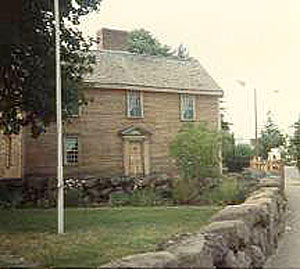
I had come from Boston – well, from a town
outside of Boston really - a town named Braintree, where I grew up
in unrelenting poverty and abuse.
Two Presidents were born
and buried in Braintree; John Adams and John Quincy Adams.
Their homes, very familiar to those of us growing up in
Braintree, are still kept as shrines in nearby Quincy, which
in the 17th century was all part of Braintree.
Photo above:
John Adams’ Birthplace in Quincy, MA
|
| |
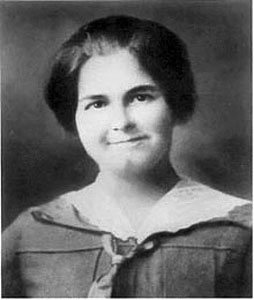 My
mother had already been abandoned with four children to
raise all by herself when she brought me into the world,
illegitimate and unwanted. By then, my three half brothers
and sister were already teen-agers and about to leave. When
they had gone there was only my mother and myself left. My
mother had already been abandoned with four children to
raise all by herself when she brought me into the world,
illegitimate and unwanted. By then, my three half brothers
and sister were already teen-agers and about to leave. When
they had gone there was only my mother and myself left.
I grew up in surroundings of unrelieved poverty. The smell
of it lingered with me all my life. “The dark brown taste of
being poor” was the way famed actress Ruth Gordon
characterized it. As a matter of fact, Ruth Gordon grew up
nearby, of course long before I was born.
Photo: My mother, Ethel Mae Grover |
The first thing I can remember
was my Mother sitting me on a park bench and telling me to stay
there while she went off to work as a seamstress. I did exactly as
she had told me to do; sitting there quietly all day long, never
moving, never wandering off until she came back to collect me five
or six hours later. I must have been three or four years old. What
was I thinking of to be so obedient? No one came to ask why I was
alone, or was I lost or abandoned? I had no toys. I didn’t know what
ice cream or candy was. I just sat and looked at the railroad tracks
and an occasional train passing by.
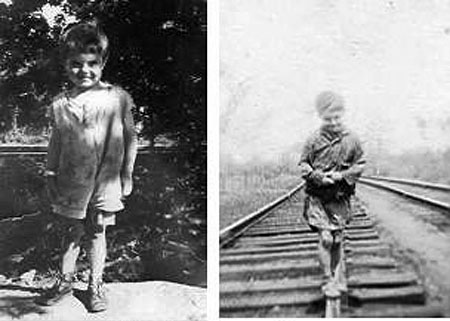
Photos: At about age 3 or 4 years
The
many Braintree homes we lived in were invariably near
railroad tracks. I spent a lot of time on those tracks,
learning to balance on the rails, walking and running to and
from school on them, playing in the railroad yards and
dreaming of the day when I could get on one of the trains
and go to someplace, anyplace away from Braintree and the
miserable life I was born into.
My siblings knew of my mysterious origins long before I did.
Having a different father than they, I was treated already
an outcast to start with. |
|
|
School Days
Returning to my the third grade class after Thanksgiving
Day, the teacher asked each of us to stand and tell the
class about our holiday dinners. This of course was a very
insensitive thing for her to do. Each child described their
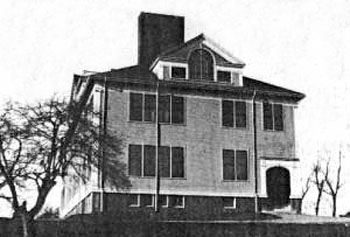 Thanksgiving
dinner in detail – the turkey, the pumpkin and mince pies,
the fruits and nuts, none of which I had ever tasted. When
my turn came, even though I was an unflinching truth-teller,
I couldn’t bring myself to reveal that I had nothing
remotely like that. I simply repeated what the others had
told and even at seven years of age I could sense the
teacher suspected it was all a pack of lies. Thanksgiving
dinner in detail – the turkey, the pumpkin and mince pies,
the fruits and nuts, none of which I had ever tasted. When
my turn came, even though I was an unflinching truth-teller,
I couldn’t bring myself to reveal that I had nothing
remotely like that. I simply repeated what the others had
told and even at seven years of age I could sense the
teacher suspected it was all a pack of lies.
Photo: Monatiquot School
When my mother told me when that there was no Santa Claus it
was the first time I’d ever heard of him anyway. She was
making sure I wouldn’t expect any presents that she couldn’t
give me.
Poor, fatherless, wearing rags and hand-me-downs I soon
became painfully shy. All this naturally made me a target
for the bullies at the Monatiquot Grammar School, grades one
through eight. When it was one on one I could defend myself
but not against a gang. I dreaded the two days each week
that had required periods of outdoor sports and I would be
subject to their taunts and punches. Winter was a relief as
it was held in the gymnasium with structured calisthenics.
To me, that was more like dancing. And there was the radio
with after school programs like Captain Midnight, The Lone
Ranger, Superman. These fifteen-minute dramas aimed at young
boys sparked the imagination, filled in my loneliness.
The First Dance Lesson
A man living in the single Braintree hotel was giving a
dancing class. I don’t know who he was or how and why he
rounded up about five of us ten year old boys. He was hoping
to teach us tap dancing though none of us had any idea of
what he was trying to do. It was possibly a basic class
given to introduce local children to dancing. Or more
likely, this retired man wanted to teach some children the
tap dancing he knew, merely for something to do. It left no
impression on me and certainly no inner call to dance.
|
|
During one summer there came a ray of
happiness. Two weeks spent with my mother by the ocean at
Brant Rock in a house trailer my brother had built. It was
like paradise playing among the rocks and watching the tides
of the New England coast. I was about to turn thirteen when
I had the experience of puppy love for the girl in the next
trailer, holding hands and going for walks along the beach
together. After the two weeks ended we parted with undying
love and I sent her silly, boyish love letters, actually
post cards with all my grandiose plans about someday
becoming a movie director or a Walt Disney animator. She
never answered. It was soon forgotten. |
|
When I became fifteen my Mother finally told me the truth
about my origin; that the husband who abandoned her was not
my real father after all and I had a different father than
my brothers and sister. I was an accident and unwanted.
Could this be the reason I felt so different from my family?
Why my Mother had once abandoned me in the park, unguarded?
Who was he? Where did he come from?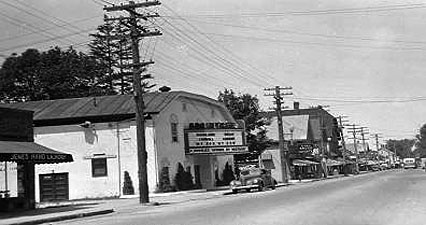 How did they meet? All I managed to learn was that he was
Canadian, possibly French Canadian. In later years all these
questions arose but the secrets had died with her. Although
I kept the name, there is actually no Holden blood in me at
all.
How did they meet? All I managed to learn was that he was
Canadian, possibly French Canadian. In later years all these
questions arose but the secrets had died with her. Although
I kept the name, there is actually no Holden blood in me at
all.
Photo: Braintree Movie Theater
These painful memories of an unhappy childhood are best
forgotten, but I found a well-worn path of escape and it led
to a sanctuary; the local movie theater. The Braintree
Theater could hardly be called a grand movie palace but to
me it was a portal to another world. Beginning as a twelve
year old I went as often as I could and sat alone among
adults as the stories of adventure, mystery and excitement
unfolded before my eyes. Then walking home late at night
along deserted streets to a silent and cold house and a
corner cot. |
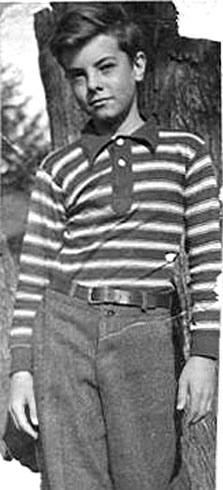
The Braintree Theater had no stage, only curtains
that opened and closed for each of the double features.
The Dead End Kids, popular movie stars of the period, once
stopped off in Braintree on a personal appearance tour of some kind.
With no backstage area available, they played baseball with us local
kids in the parking lot until time to come out and stand in front of
the curtains. I’ve long forgotten what they said or did but every
kid in town must have been there and the manager had to sit us two
in each seat.
Truly, movies shaped my life. There was a saying at the time that
movies should be more like real life. I thought life should be more
like the movies. They taught me history, ethics, how to deal with
adversity and propelled me through those difficult years.
Photo: About 12 years old
High School - With Music
About this time an encounter with scarlet fever left
me nearly deaf. While in classes I would strain to hear the teacher
who would often send me to the Principals’ office to get a scolding.
They thought I was either stupid or just being troublesome. The
awful truth was that I was just too shy to tell him, or anyone, that
I simply could not hear what they were saying.
When the final, eighth grade of grammar school arrived, there was no
one to guide me as to what High School subjects I should elect for
the coming year. I simply copied what someone sitting next to me had
written on the questionnaire which were all subjects for a
commercial course when I would have been more suited to a liberal
curriculum.
I entered High School with remedial English. Apparently I had failed
that subject though I instinctively spoke grammatically correct
English picked up from all the reading I had done. Still, the rules
of grammar and correctly diagramming sentences continually eluded
me. The teacher wanted to see my Mother about it but my Mother never
appeared. I had to deal with it alone.
Be that as it may, during my Freshman year the English teacher
praised me for a piece I wrote about the
Moldau River in Czechoslovakia. What on earth would I know of
Czechoslovakia? I just felt inspired to write it after hearing the
music by Smetana on the radio. There was not much classical music on
the radio in those days except the New York Philharmonic on Sunday
afternoon and the Metropolitan Opera on Saturday that I listened to
devotedly, despite my mother’s hatred of it. She went out of the
house when it was on.
What distressed me most during my first year of High School were not
the subjects I had chosen. It was the gym period. The reason: each
student had to supply his or her own gym outfit which for boys meant
a pair of gym shorts, a jock strap, t-shirt and sneakers. I had no
idea where money was to come from for such a luxury. I think the
school eventually supplied me an outfit.
I
remained an outcast. My only friend was another outcast. He was a
Jehovah’s Witness and was shunned due to his not saluting the flag,
a requirement of his faith that believes allegiance should only be
given to God. We would stick together during gym periods and warn
each other against approaching onslaughts of the school’s bigger
bullies.
Then
I began listening to the Metropolitan Opera radio broadcasts more
avidly. Not only listening but following along with the vocal scores
that I got from the public library. My knowledge of classical music
grew by leaps and bounds. In musical appreciation class I was the
only one who could identify selections the teacher played, an
accomplishment that certainly didn’t endear me to any of my
classmates!
Being nearly deaf, the only thing left for me to do was to leave
school. I thought I could continue my education at home alone with
home study courses and not have to face the ordeals of school
everyday. Home then became my own private school and I seldom went
out. I ordered a book of high school subjects by mail and created a
daily schedule for my self-taught classes that I rigidly followed
just as if in public school. How is that for self discipline?
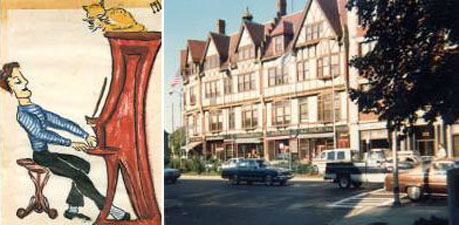
Somehow, probably from odd jobs, I acquired a broken down, out of
tune upright piano from the Salvation Army and began to learn how to
play it.
Photo left: An image I drew at the time
Photo right: Quincy Conservatory was in this building
Every Saturday I pedaled my
bicycle into Quincy where there was an actual Conservatory Of Music.
The piano teacher came there every Saturday to give lessons. He
himself was a student at the New England Conservatory in Boston. My
weekly lesson was fifty cents, a sum I earned by delivering papers,
picking blueberries or weeding gardens. I soon became the
Conservatory’s star pupil and was saved for the last in their annual
recital. I played a watered down version of the first movement of
Grieg’s piano concerto followed by Gershwin’s “Rhapsody In Blue”,
reduced. It’s hard to believe no one from my family came to listen
or give me support of any kind. Seeing this, my teacher was
obviously saddened as well as a gentleman and his wife in the
audience who must have felt so sorry for this pathetic, neglected
boy they took me afterwards for an ice cream soda, a treat I
remember to this day.
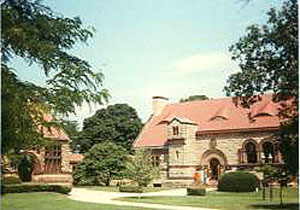
Photo: The Thomas Crane Public Library, Quincy,
MA
Quincy had other attractions, like four movie theaters and a public
library with private booths where you could listen to their
collection of music records.
Books That Can Change Lives
Then something happened that caused a complete about
face – a total shift in consciousness. It was a book on a shelf at
the Thomas Crane Public Library in Quincy that mysteriously caught
my eye. A book that was to set my course in a similar but different
path than music and would turn out to be my life’s endeavor.
It was the biography of the Russian ballet dancer, Vaslav Nijinsky,
written by his wife, Romola. I couldn’t put it down and read it
three times in a row until it dawned on me that perhaps I could be a
dancer too, even a dancer like Nijinsky. At least it was a wondrous
dream that could possibly lift me out of my wretched surroundings
and perhaps
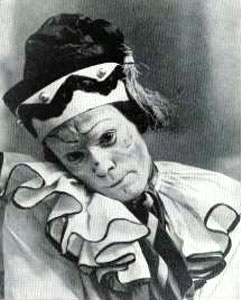 find
a place for me in this newly discovered world of dance. There were
so many parallels between Nijinsky’s life and my own. He came from a
poor and dysfunctional family. So did I. He was painfully shy. So
was I. I decided then and there that I would be a dancer too, like
him, ignoring the all-important fact that he became grievously
insane by the time he reached thirty! find
a place for me in this newly discovered world of dance. There were
so many parallels between Nijinsky’s life and my own. He came from a
poor and dysfunctional family. So did I. He was painfully shy. So
was I. I decided then and there that I would be a dancer too, like
him, ignoring the all-important fact that he became grievously
insane by the time he reached thirty!
Photo: Nijinsky as
Petrushka - the puppet with a
soul
But this Nijinsky was a Russian
and a graduate of the Imperial Ballet School in St. Petersburg. I
was an American boy with absolutely no one to help and no one I
could talk to about this newly found ambition. I had found refuge
from my unhappiness in dreams of becoming a dancer but I would first
have to contrive a world of my own and fit into it. So I quickly and
totally forgot all about the piano and my unrealistic dream of
becoming a concert pianist to pursue dancing – a beauty I must know.
Though I had never even seen a ballet, I became entirely intoxicated
by this fantasy and started to refashion reality to create a new
identity for myself.
There was a text-book on ballet by Kay Ambrose, the only one
available at that time in Quincy. It was not a proper text-book but
an introduction to ballet technique written for ballet fans but had
charming illustrations of body positions and some basic ballet
steps. I spent spend ours trying to imitate these drawings of
dancers with my own body.
I began to comb my hair in the Nijinsky 1910 fashion. I faked the
turned out walk of a dancer and imagined I was Nijinsky himself. Day
by day the picture crystallized into an idealistic metamorphosis. I
found a Russian grammar at the library and began to learn the
Russian language. Soon I was able to read, all too haltingly,
Tolstoy’s “War And Peace” in Russian, with the aid of a
Russian-English dictionary. (In later years, Russian was to become
my second language).
I didn’t feel I was ready to
start my ballet lessons right away. For one thing, I needed to get
my teeth fixed. Growing up as I had without milk or proper
nourishment, my teeth were fragile. I had already lost several and
the rest were in bad shape. I also had a small case of teen-age
pimples.
There was no chance of help from
my family. in fact there wouldn’t be even the slightest
encouragement. If my love of classical music was scorned by them,
how would they accept me as a dancer, let alone a ballet dancer. In
New England at that time, and possibly still, boys simply do not
dance. Even interest in classical music was considered odd for a
boy. It all had to be kept secret.
Finishing High School was not as
important as extending my life away from Braintree. I had outgrown
it and also Quincy. Now my destination would have to become the not
too distant city of Boston.
During one of my lonely train trips into Boston I found a teacher, a
kindly Russian gentleman - Senia Russakoff. He and his wife, Regina,
were Russian Jews from Petrograd. In America they had danced in a
vaudeville circuit. They actually lived in their studio on Boylston
Street in downtown Boston, sleeping on cots but they were ashamed to
reveal this, telling anyone who asked that they lived on ‘the hill’,
meaning the nearby, very exclusive Beacon Hill. In the distant past
Russakoff had been the teacher of none other than Ray Bolger, then
already long famous for his role as the scarecrow in “The Wizard Of
Oz”.
I pretended the Russakoffs were
my Russian parents and their shabby studio was really the Imperial
School Of Ballet in St. Petersburg, Russia.
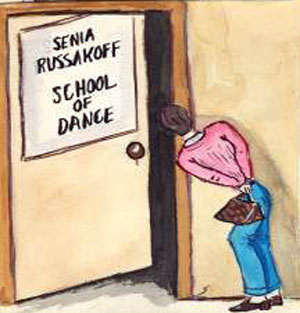 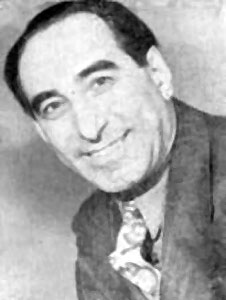 Photos:
A drawing I made and a picture of Senia Russakoff Photos:
A drawing I made and a picture of Senia Russakoff
My first lesson was private, or ‘prriwat’
as Senia Russakoff would say in his heavy Russian accent. In
fact he only gave private lessons as they did not have
enough students for regular classes. As I already knew the
basic positions from the Kay Ambrose book which I could show
in an approximation, I began to realize this was no proper
ballet lesson. I was not at all surprised when the lesson
ended with perhaps the most spectacular and well-known step
in all of Russian character dancing. “Prisyadki” is a
movement from Russian folk dance where you squat down and
alternately kick the legs out. I must have shown a natural
talent for this particular step as Russakoff had me doing
 hundreds
of them. The following day I could barely walk! hundreds
of them. The following day I could barely walk!
Image: Animated dancer demonstrating prisyadki kicks
|
I
could only afford one lesson a week, but I went into the studio
every morning as if it were my real home, staying there all day
either practicing or helping Senia write his dictionary of ballet
terms on his typewriter. This must have really been his idea to keep
me occupied and out of their way. Both Senia and his wife Regina
suspected, and once even asked me if I came from a broken home. Why
else would I want to spend so much time with them as if they were my
family? Little did they know!
|
|
|
|
Copyright ©2006-2021 OKAY Multimedia |
|
|

 My
mother had already been abandoned with four children to
raise all by herself when she brought me into the world,
illegitimate and unwanted. By then, my three half brothers
and sister were already teen-agers and about to leave. When
they had gone there was only my mother and myself left.
My
mother had already been abandoned with four children to
raise all by herself when she brought me into the world,
illegitimate and unwanted. By then, my three half brothers
and sister were already teen-agers and about to leave. When
they had gone there was only my mother and myself left.

 How did they meet? All I managed to learn was that he was
Canadian, possibly French Canadian. In later years all these
questions arose but the secrets had died with her. Although
I kept the name, there is actually no Holden blood in me at
all.
How did they meet? All I managed to learn was that he was
Canadian, possibly French Canadian. In later years all these
questions arose but the secrets had died with her. Although
I kept the name, there is actually no Holden blood in me at
all.


 find
a place for me in this newly discovered world of dance. There were
so many parallels between Nijinsky’s life and my own. He came from a
poor and dysfunctional family. So did I. He was painfully shy. So
was I. I decided then and there that I would be a dancer too, like
him, ignoring the all-important fact that he became grievously
insane by the time he reached thirty!
find
a place for me in this newly discovered world of dance. There were
so many parallels between Nijinsky’s life and my own. He came from a
poor and dysfunctional family. So did I. He was painfully shy. So
was I. I decided then and there that I would be a dancer too, like
him, ignoring the all-important fact that he became grievously
insane by the time he reached thirty!
 Photos:
A drawing I made and a picture of Senia Russakoff
Photos:
A drawing I made and a picture of Senia Russakoff hundreds
of them. The following day I could barely walk!
hundreds
of them. The following day I could barely walk!